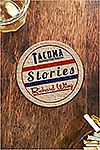Review–Tacoma Stories by Richard Wiley (Korea)
 Tacoma Stories
Tacoma Stories
by Richard Wiley (Korea, 1967-69)
Bellevue Literary Press, 2019
270 pages
$16.99 (paperback)
Reviewed by Mark Jacobs (Paraguay 1978-80)
I can’t get through a day without it. Reading, that is. Sometimes, I have a hard time going pageless for a couple of hours. I’m so habituated to reading, I can forget why I do it. Tacoma Stories just reminded me why: one reads in the hope of delight. And that’s what Wiley’s new book provides. The linked stories that make up the collection are deeply pleasureful reads.
How does he do it? One way is with the sentences. Wiley writes nothing like Kafka, but the unexpected leap from one sentence to the next in Tacoma Stories can evoke Kafka’s extraordinary, nerve-jangling transitions. Apposite sentences end paragraphs where they need to be ended. They describe a character. They figure in dialogue. Real readers, true recidivists who cannot resist stories between covers, will find plenty to savor here.
The pleasure of the book is also to be found in the characters. Tacoma Stories is built on a structural conceit that links people in Tacoma, Washington, in separate stories that span several decades. It coheres around a vision of the whole they inadvertently constitute, and their relationships, failed or fraught, new or renewing. Characters collide. They screw things up or patch things up. Once in a while, they surprise themselves into knowledge. They say absurdly wrong things. Now and then, they say the exactly right thing. The cast is varied. So are the situations into which Wiley puts them. Read their stories, and these people will find a foothold first in your imagination and then in your memory. They’ll stick around.
Another source of pleasure in Tacoma Stories is its humor. I’m not talking so much about comic situations, although they exist in the book; or about witty dialogue, and that’s there, too. I am talking about a bone-deep humor that pervades the collection. One hears it in the narrator’s voice, in his attitude toward his characters and their dilemmas. But it’s not something that’s simply added in, the way basil leaves are added to soup. Rather, it’s molecular. It inheres in the structure. Take it away, and the book would collapse. (The same is true of the humor in Moby Dick.) The profound humor in Wiley’s book exists because it exists, but at the same time it serves another purpose. It is, finally, a diplomatic way to talk about love.
Russell Banks wrote that, “If there is such a thing as global fiction, Wiley is writing it.” A former Peace Corps volunteer, the author of Ahmed’s Revenge has earned his reputation for knowing the places around the world whereof he writes. How does that happen? That sort of knowing calls for an imaginative capacity that is obvious in Wiley’s writing. The other becomes, upon examination, another.
The fictive imagination thrives on a way of seeing that is at the same time a way of feeling. It can lead, in some writers, to an enhanced sense of place that becomes, at its best, a kind of shining. The Kenya of Ahmed’s Revenge is a clear case in point. In Tacoma Stories, Wiley brings that enhanced sense of place back home. Nothing in the book – the street names, the beaches, the house in which Ted Bundy grew up, Lars Larson Motors, and least of all the characters who inhabit these stories – would countenance substitutes. The book is grounded on the author’s home ground.
Read it.
 A Peace Corps volunteer in Paraguay, and later a Foreign Service officer, Mark Jacobs has published more than 130 stories in magazines including The Atlantic, Playboy, The Baffler, The Kenyon Review, and The Hudson Review. Stories of his have won The Iowa Review Fiction Prize, the Kafka Prize, and the Eyster Prize. His five books include A Handful of Kings, published by Simon and Shuster, and Stone Cowboy, by Soho Press. His website can be found at: http://www.markjacobsauthor.com.
A Peace Corps volunteer in Paraguay, and later a Foreign Service officer, Mark Jacobs has published more than 130 stories in magazines including The Atlantic, Playboy, The Baffler, The Kenyon Review, and The Hudson Review. Stories of his have won The Iowa Review Fiction Prize, the Kafka Prize, and the Eyster Prize. His five books include A Handful of Kings, published by Simon and Shuster, and Stone Cowboy, by Soho Press. His website can be found at: http://www.markjacobsauthor.com.
No comments yet.
Add your comment